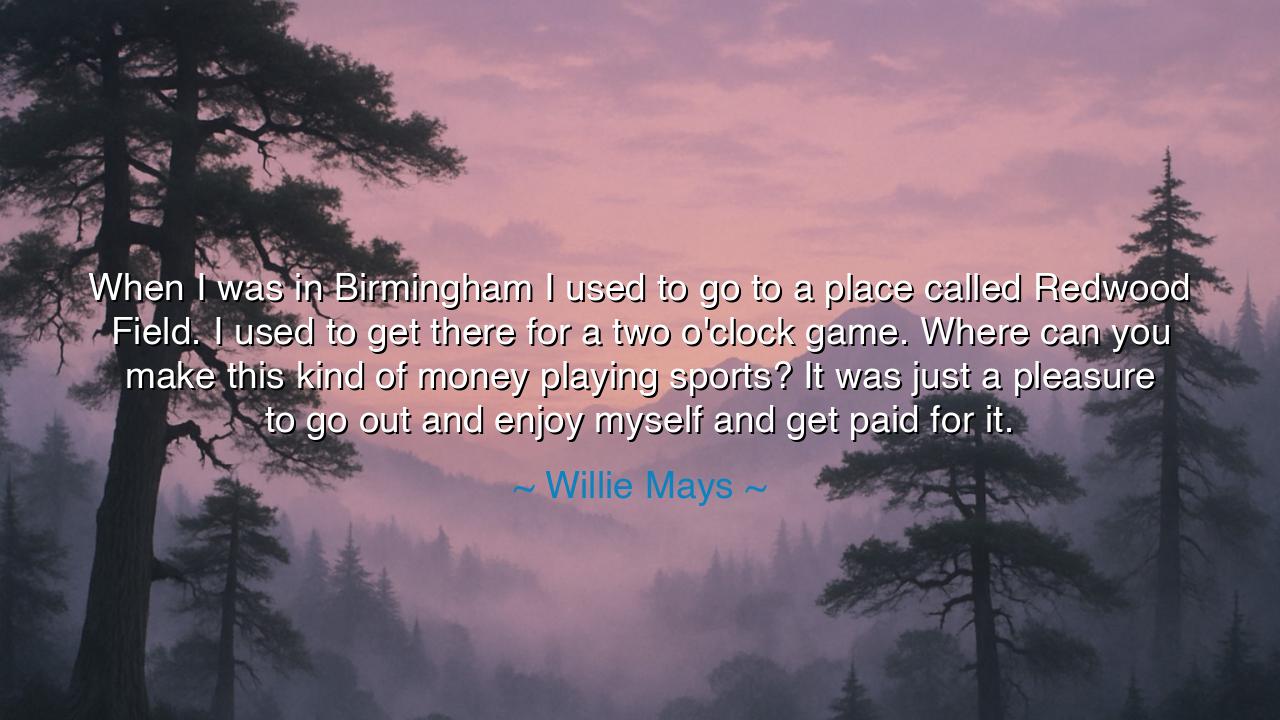
When I was in Birmingham I used to go to a place called Redwood
When I was in Birmingham I used to go to a place called Redwood Field. I used to get there for a two o'clock game. Where can you make this kind of money playing sports? It was just a pleasure to go out and enjoy myself and get paid for it.






Willie Mays once recalled with wonder: “When I was in Birmingham I used to go to a place called Redwood Field. I used to get there for a two o’clock game. Where can you make this kind of money playing sports? It was just a pleasure to go out and enjoy myself and get paid for it.” These words, spoken from the heart, shine with the joy of a man who discovered that labor need not always be burden but could also be delight. In his memory of Redwood Field, we glimpse not only the beginnings of a legendary career, but also a truth about the union of passion and reward.
At the root of this saying is the idea of pleasure in work. Mays marvels at the fact that he could do what he loved—sports—and be rewarded with pay. For him, the field was not merely a place of toil, but a garden of joy, where every throw and swing brought both satisfaction and livelihood. He speaks with the awe of a youth who realized that the duties of life can align with the desires of the heart. Few lessons are greater than this: that the highest fortune in life is to have one’s labor become one’s joy.
Yet behind this memory lies the weight of history. Mays played for the Birmingham Black Barons, in the days when segregation forced Black athletes into separate leagues, away from the white crowds of Major League Baseball. To him, Redwood Field was not just a ballpark; it was a sanctuary where dreams could be lived despite the barriers of injustice. The pay may have seemed modest by later standards, but for a boy who grew up in hardship, it was proof that talent and joy could carve out a place in a world that often sought to deny opportunity. His words carry both innocence and resilience: pleasure in the game, pride in the pay, and gratitude for the chance itself.
This story finds echoes in history. The poet Homer sang of heroes who found joy in the very struggles of war, not because battle was sweet, but because it gave them a place to test themselves and win immortal honor. Likewise, the medieval artisan who carved cathedrals spoke of the strange joy of work that demanded both sweat and spirit. Mays, in his way, belongs to this tradition: men and women who found in their craft something that transcended mere survival. His wonder—“Where can you make this kind of money playing sports?”—is not only about wages, but about the miracle of living by one’s gift.
Mays’ reflection also teaches us the value of gratitude. In a world that often grows numb to blessings, his words remind us to marvel at what is given. He did not see his early career as a burden, but as a gift—an opportunity to play, to enjoy, and to be rewarded. Gratitude transforms labor into joy, and it is this spirit that carried Mays from the fields of Birmingham to the pinnacles of baseball greatness. Without gratitude, work becomes chains; with gratitude, it becomes wings.
The lesson here is profound: seek not only what pays well, but what stirs the soul. If you can find a way, as Willie Mays did, to join pleasure with work, then you will walk a path of both success and fulfillment. Even if the beginnings are humble, even if the world sets obstacles before you, the spirit that delights in labor will find strength to endure and to rise.
So I say to you: remember Redwood Field. Remember the boy who showed up early, eager to play, and astonished that he could be paid for what he loved. Let that be your model in whatever field you choose. Strive to align your gifts with your work, your joy with your duty, and your gratitude with your reward. For to labor with love is to be free, and to be paid for joy is one of life’s greatest blessings.






AAdministratorAdministrator
Welcome, honored guests. Please leave a comment, we will respond soon